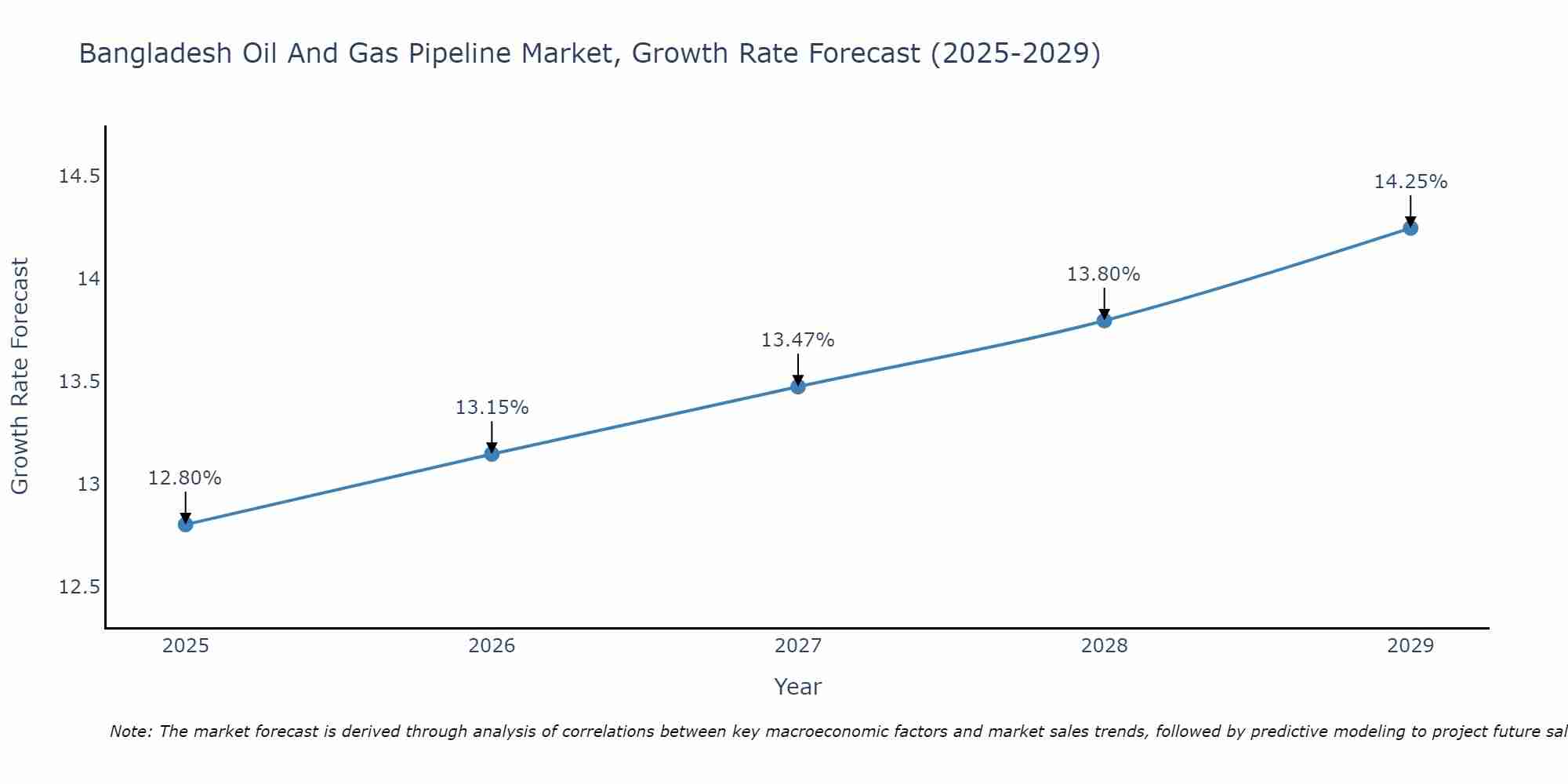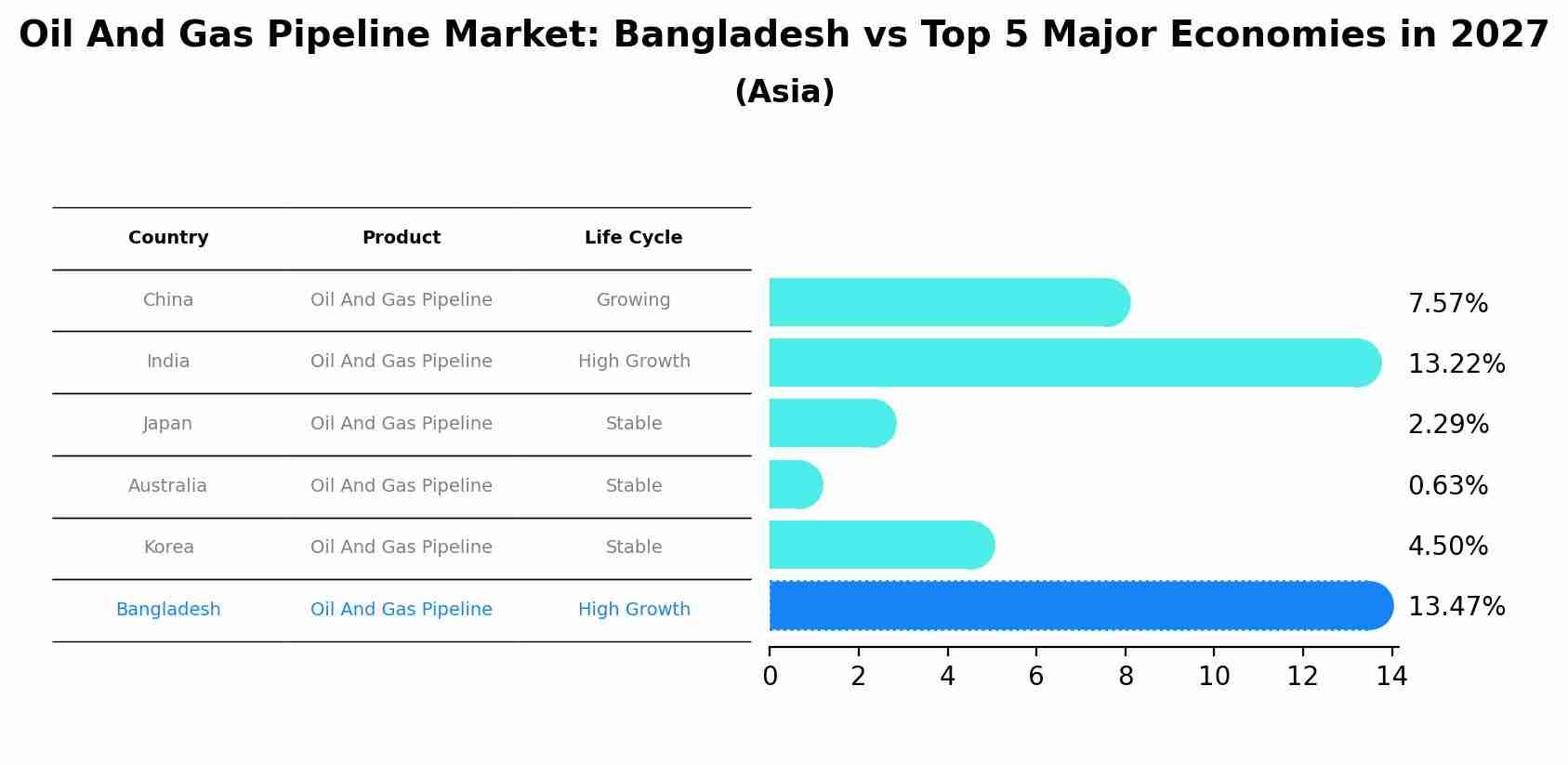Bangladesh Oil And Gas Pipeline Market (2025-2031) Outlook | Industry, Growth, Revenue, Share, Forecast, Value, Size, Companies, Trends & Analysis
| Product Code: ETC377312 | Publication Date: Aug 2022 | Updated Date: Jul 2025 | Product Type: Market Research Report | |
| Publisher: 6Wresearch | Author: Shubham Padhi | No. of Pages: 75 | No. of Figures: 35 | No. of Tables: 20 |
Bangladesh Oil And Gas Pipeline Market Size Growth Rate
The Bangladesh Oil And Gas Pipeline Market is poised for steady growth rate improvements from 2025 to 2029. The growth rate starts at 12.80% in 2025 and reaches 14.25% by 2029.

Oil And Gas Pipeline Market: Bangladesh vs Top 5 Major Economies in 2027 (Asia)
By 2027, Bangladesh's Oil And Gas Pipeline market is forecasted to achieve a high growth rate of 13.47%, with China leading the Asia region, followed by India, Japan, Australia and South Korea.

Bangladesh Oil And Gas Pipeline Market Synopsis
The Bangladesh Oil and Gas Pipeline Market is experiencing steady growth due to the country`s increasing energy demands and efforts to enhance energy security. The market is mainly driven by government initiatives to expand the natural gas distribution network and improve oil and gas transportation infrastructure. The construction of new pipelines and the renovation of existing ones are crucial to meet the growing domestic demand for oil and gas products. Key players in the market include state-owned Bangladesh Petroleum Corporation (BPC) and private companies like Chevron and Petrobangla. However, challenges such as land acquisition issues, regulatory hurdles, and environmental concerns may hinder the market`s growth. Overall, the Bangladesh Oil and Gas Pipeline Market presents opportunities for investment and expansion in the coming years.
Bangladesh Oil And Gas Pipeline Market Trends
The Bangladesh Oil and Gas Pipeline market is currently experiencing significant growth driven by increasing energy demand and government initiatives to enhance domestic oil and gas infrastructure. Key trends include the development of new pipeline projects to expand the country`s energy transmission network, the adoption of advanced technologies for pipeline construction and maintenance, and a focus on improving operational efficiency and safety standards. Additionally, partnerships between international and local companies are emerging to leverage expertise and investment opportunities in the sector. The market is also witnessing a shift towards sustainable and environmentally friendly practices, with an emphasis on reducing carbon emissions and promoting renewable energy sources in line with global energy transition goals. Overall, the Bangladesh Oil and Gas Pipeline market is poised for continued expansion and modernization in the coming years.
Bangladesh Oil And Gas Pipeline Market Challenges
In the Bangladesh Oil and Gas Pipeline Market, challenges are primarily related to infrastructure development, regulatory hurdles, and security concerns. The country faces difficulties in expanding its pipeline network due to limited investment in infrastructure development. Regulatory complexities, including bureaucratic red tape and unclear policy frameworks, often hinder the timely implementation of pipeline projects. Additionally, security risks such as theft, sabotage, and geopolitical tensions pose significant challenges to the safe and efficient operation of oil and gas pipelines in Bangladesh. Overcoming these challenges will require coordinated efforts from the government, industry stakeholders, and international partners to address infrastructure gaps, streamline regulations, and enhance security measures to ensure the sustainable growth of the oil and gas pipeline market in Bangladesh.
Bangladesh Oil And Gas Pipeline Market Investment Opportunities
The Bangladesh Oil and Gas Pipeline market presents attractive investment opportunities due to the country`s increasing energy demand and government initiatives to expand its pipeline infrastructure. With a growing economy and rising population, there is a need for reliable and efficient transportation of oil and gas resources. Investments in pipeline construction, maintenance, and modernization projects offer significant potential for returns. Additionally, the government`s focus on promoting energy security and reducing dependency on imported fuels further enhances the market`s appeal for investors. Collaborating with local companies or forming partnerships with international players can help capitalize on these opportunities and contribute to the development of Bangladesh`s energy sector. Overall, the Bangladesh Oil and Gas Pipeline market is poised for growth, making it a promising area for strategic investments.
Jordan Agar Market Government Policies
The government of Bangladesh has been actively promoting the development of the oil and gas pipeline market through various policies and initiatives. The country has implemented a Gas Sector Master Plan to enhance the efficiency and reliability of gas transmission and distribution networks. In addition, the government has encouraged private sector participation in pipeline projects through various incentives and concessions. Furthermore, there are regulations in place to ensure the safety and environmental sustainability of pipeline operations. Overall, the government`s policies aim to attract investments, improve infrastructure, and strengthen the energy sector to meet the growing demand for oil and gas in Bangladesh.
Bangladesh Oil And Gas Pipeline Market Future Outlook
The Bangladesh oil and gas pipeline market is expected to witness significant growth in the coming years due to the increasing demand for energy infrastructure to support the country`s economic development. The government`s initiatives to expand the natural gas distribution network, enhance energy security, and attract foreign investments in the sector will drive the market growth. Additionally, the discovery of new gas reserves in Bangladesh and the potential for increased oil and gas exploration activities in the region will further boost the demand for pipeline infrastructure. However, challenges such as regulatory uncertainties, environmental concerns, and competition from alternative energy sources may impact the market growth. Overall, the Bangladesh oil and gas pipeline market is poised for expansion, offering opportunities for both domestic and international players in the sector.
Key Highlights of the Report:
- Bangladesh Oil And Gas Pipeline Market Outlook
- Market Size of Bangladesh Oil And Gas Pipeline Market, 2024
- Forecast of Bangladesh Oil And Gas Pipeline Market, 2031
- Historical Data and Forecast of Bangladesh Oil And Gas Pipeline Revenues & Volume for the Period 2021 - 2031
- Bangladesh Oil And Gas Pipeline Market Trend Evolution
- Bangladesh Oil And Gas Pipeline Market Drivers and Challenges
- Bangladesh Oil And Gas Pipeline Price Trends
- Bangladesh Oil And Gas Pipeline Porter's Five Forces
- Bangladesh Oil And Gas Pipeline Industry Life Cycle
- Historical Data and Forecast of Bangladesh Oil And Gas Pipeline Market Revenues & Volume By Location of Deployment for the Period 2021 - 2031
- Historical Data and Forecast of Bangladesh Oil And Gas Pipeline Market Revenues & Volume By Onshore for the Period 2021 - 2031
- Historical Data and Forecast of Bangladesh Oil And Gas Pipeline Market Revenues & Volume By Offshore for the Period 2021 - 2031
- Historical Data and Forecast of Bangladesh Oil And Gas Pipeline Market Revenues & Volume By Type for the Period 2021 - 2031
- Historical Data and Forecast of Bangladesh Oil And Gas Pipeline Market Revenues & Volume By Crude Oil Pipeline for the Period 2021 - 2031
- Historical Data and Forecast of Bangladesh Oil And Gas Pipeline Market Revenues & Volume By Gas Pipeline for the Period 2021 - 2031
- Bangladesh Oil And Gas Pipeline Import Export Trade Statistics
- Market Opportunity Assessment By Location of Deployment
- Market Opportunity Assessment By Type
- Bangladesh Oil And Gas Pipeline Top Companies Market Share
- Bangladesh Oil And Gas Pipeline Competitive Benchmarking By Technical and Operational Parameters
- Bangladesh Oil And Gas Pipeline Company Profiles
- Bangladesh Oil And Gas Pipeline Key Strategic Recommendations
Frequently Asked Questions About the Market Study (FAQs):
- Single User License$ 1,995
- Department License$ 2,400
- Site License$ 3,120
- Global License$ 3,795
Search
Thought Leadership and Analyst Meet
Our Clients
Related Reports
- Canada Oil and Gas Market (2026-2032) | Share, Segmentation, Value, Industry, Trends, Forecast, Analysis, Size & Revenue, Growth, Competitive Landscape, Outlook, Companies
- Germany Breakfast Food Market (2026-2032) | Industry, Share, Growth, Size, Companies, Value, Analysis, Revenue, Trends, Forecast & Outlook
- Australia Briquette Market (2025-2031) | Growth, Size, Revenue, Forecast, Analysis, Trends, Value, Share, Industry & Companies
- Vietnam System Integrator Market (2025-2031) | Size, Companies, Analysis, Industry, Value, Forecast, Growth, Trends, Revenue & Share
- ASEAN and Thailand Brain Health Supplements Market (2025-2031) | Strategy, Consumer Insights, Analysis, Investment Trends, Opportunities, Growth, Size, Share, Industry, Revenue, Segments, Value, Segmentation, Supply, Forecast, Restraints, Outlook, Competition, Drivers, Trends, Demand, Pricing Analysis, Competitive, Strategic Insights, Companies, Challenges
- ASEAN Bearings Market (2025-2031) | Strategy, Consumer Insights, Analysis, Investment Trends, Opportunities, Growth, Size, Share, Industry, Revenue, Segments, Value, Segmentation, Supply, Forecast, Restraints, Outlook, Competition, Drivers, Trends, Demand, Pricing Analysis, Competitive, Strategic Insights, Companies, Challenges
- Europe Flooring Market (2025-2031) | Outlook, Share, Industry, Trends, Forecast, Companies, Revenue, Size, Analysis, Growth & Value
- Saudi Arabia Manlift Market (2025-2031) | Outlook, Size, Growth, Trends, Companies, Industry, Revenue, Value, Share, Forecast & Analysis
- Uganda Excavator, Crane, and Wheel Loaders Market (2025-2031) | Strategy, Consumer Insights, Analysis, Investment Trends, Opportunities, Growth, Size, Share, Industry, Revenue, Segments, Value, Segmentation, Supply, Forecast, Restraints, Outlook, Competition, Drivers, Trends, Demand, Pricing Analysis, Competitive, Strategic Insights, Companies, Challenges
- Rwanda Excavator, Crane, and Wheel Loaders Market (2025-2031) | Strategy, Consumer Insights, Analysis, Investment Trends, Opportunities, Growth, Size, Share, Industry, Revenue, Segments, Value, Segmentation, Supply, Forecast, Restraints, Outlook, Competition, Drivers, Trends, Demand, Pricing Analysis, Competitive, Strategic Insights, Companies, Challenges
Industry Events and Analyst Meet
Whitepaper
- Middle East & Africa Commercial Security Market Click here to view more.
- Middle East & Africa Fire Safety Systems & Equipment Market Click here to view more.
- GCC Drone Market Click here to view more.
- Middle East Lighting Fixture Market Click here to view more.
- GCC Physical & Perimeter Security Market Click here to view more.
6WResearch In News
- Doha a strategic location for EV manufacturing hub: IPA Qatar
- Demand for luxury TVs surging in the GCC, says Samsung
- Empowering Growth: The Thriving Journey of Bangladesh’s Cable Industry
- Demand for luxury TVs surging in the GCC, says Samsung
- Video call with a traditional healer? Once unthinkable, it’s now common in South Africa
- Intelligent Buildings To Smooth GCC’s Path To Net Zero


















